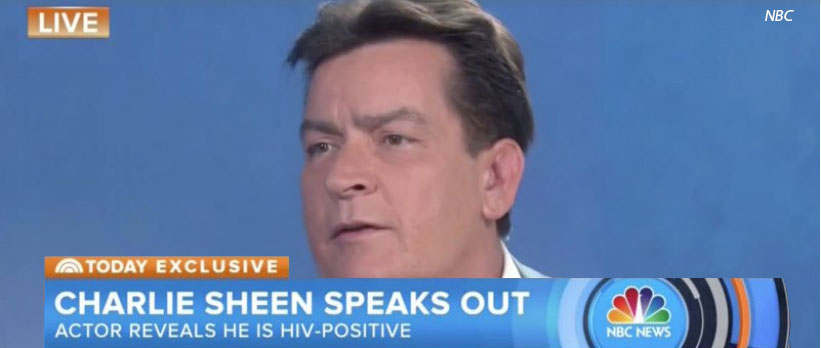Steer Clear of Alternative Treatments for HIV

Charlie Sheen isn’t setting the right example.
Just two months after actor Charlie Sheen told the world he was HIV-positive, he revealed that he had stopped taking his medications after tests showed they had succeeded in lowering the level of the virus in his blood to “non-detectable” status.
Instead, he opted for alternative treatment by a doctor in Mexico, Sam Chachoua, who has told the media that he injected himself with Sheen’s blood to give the actor confidence, reportedly saying, “Charlie, if I don't know what I'm doing, then we're both in trouble now aren't we?”
But, guess what? Soon after Sheen abandoned his prescriptions, the virus resurged in his system, and he went back on the meds, according to his manager.
Let’s be clear: Even when medications bring HIV to the “undetectable” level in your blood, the virus isn’t dead. The new therapies have kept patients alive, but they aren’t cures.
YOU MIGHT ALSO LIKE: Curing Cancer and HIV May Be Linked
More than 1.2 million people in the U.S. are living with HIV infection; almost 1 in 8 don’t know they are infected, according to the Centers for Disease Control and Prevention. HIV most seriously affects gay and bisexual men, and infections may be high among sex workers. Infection is no longer a death sentence, if you receive medications. Patients typically take three or four drugs in a single pill, which also reduces — though not to zero — the chance of giving HIV to a partner.
If you’re on the meds, you need to be careful about how they mix with other treatments, including alternative therapies. Always do your research and ask your doctor for help. For example, taking garlic supplements cut the level of the HIV drug saquinavir in half in one study. St. John’s Wort, an herb some people take for depression, interferes with the protease inhibitor indinavir.
Taking all these medications for years understandably makes people nervous — we don’t know the long-term effects. So you might be inclined to take a “drug holiday,” or cut back. Don’t do it, unless it’s your doctor’s idea. The virus will grow and damage the immune system, increasing your risk of infection and cancer. When a large study investigated whether taking holidays from medications was a good strategy, it found that they doubled the risk of getting sick or dying. You also might find that your old pill regime no longer works when you return.
Your doctor might put you on a holiday if you are having a dangerous reaction, are acutely ill, or are planning a surgery that prevents you from swallowing pills. Be sure you get specific instructions.
So what about looking for a true cure, ridding your body of the virus forever and completely with alternative or complementary treatments? Fraudsters play on that hope, with claims about cures with the “Bob Beck protocol,” “Oleander protocol,” “chlorine dioxide,” “colloidal silver,” “rife machines,” and — yes — “root canals,” from a dentist (supposedly, if you don’t get a root canal, the virus will hide in your gums even after the aggressive treatment). Typically, promises come with the argument that pharmaceutical companies have suppressed the early evidence for these miracle cures. Ask yourself if you can trust someone who is admitting that he doesn’t have strong, well-vetted evidence and only hints at what seemed to be promising results that haven’t been investigated.
When people blame drug companies, they are appealing to a very human tendency: we’d rather name an enemy and cling to silly ideas than live with fear, for example, fear of an incurable disease. “As a mechanism against that dread, it turns out that it’s much easier to believe in a conspiracy. Then you have someone to blame,” says Stephan Lewandowsky, a cognitive scientist at the University of Western Australia.
Let’s take the “Bob Beck protocol.” According to Robert Frascino, MD, an immunologist who became HIV-positive when he was infected while treating a patient with AIDS in 1991, Beck's treatment is a fraud.
“If it really cured AIDS,” Frascino writes, “would Magic Johnson and I still be putting up with taking fistfuls of antiretroviral medications and struggling with the resultant side effects? Beck claims his invention not only cures HIV/AIDS, but also ‘cancer and leukemia!’ Hmm . . . one wonders what he'll cure next. Bad breath? Dandruff? The heartbreak of psoriasis?
“When claims sound too good to be true, they usually are indeed too good to be true.”
Updated:
January 20, 2023
Reviewed By:
Janet O’Dell, RN